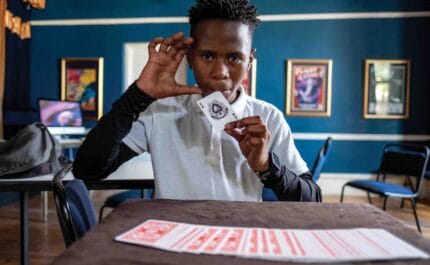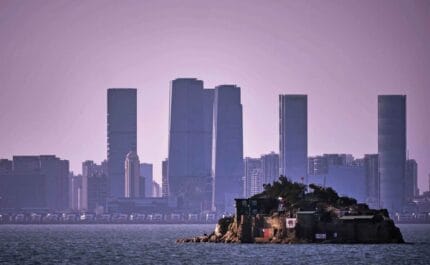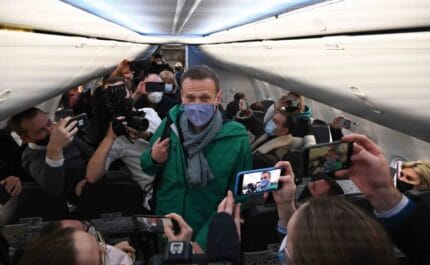The bitter end of Robert Mugabe’s presidency
When Robert Mugabe was forced to step down as president of Zimbabwe in November 2017, Harriet Salem was covering the historic events, reporting from the streets of Harare. Over the following months she travelled the country to trace the story of Africa’s longest-ruling leader through stories of those he inspired – and those he destroyed
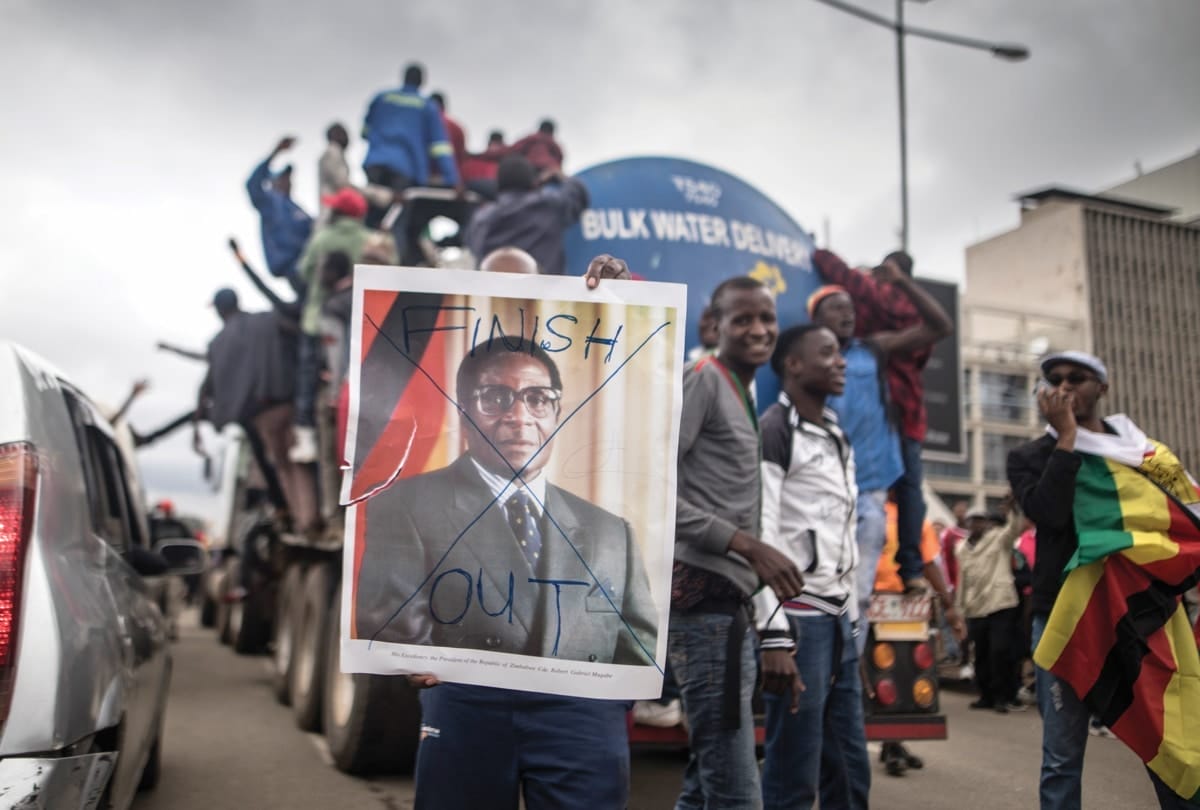
A group in Harare cheer a passing military vehicle during a demonstration demanding the resignation of Robert Mugabe, 18th November 2017. Photo: NurPhoto / SIPA USA / PA Images
21st November 2017 (Taken from: #29)
Dusk was falling in the Zimbabwean capital of Harare on Tuesday 21st November when the news broke that Robert Mugabe – a man who once said that “only God” would remove him from office – had resigned after 37 years in power. At the city’s main intersection, in the shadow of the Reserve Bank and the High Court, I watched an office worker drop to his knees and scream his delight, his whoops of joy echoed by a symphony of car horns.
The chain of events leading to the celebrations of 21st November had started two weeks earlier when Mugabe, then 93, fired his right-hand man, Vice President Emmerson Mnangagwa. It was the climax of a long internal power struggle inside ZANU-PF, Zimbabwe’s ruling party. Mnangagwa and Mugabe’s wife, Grace, were vying to succeed the ageing president and the former had won the crucial backing of the military, which had long propped up Mugabe’s rule. By dismissing Mnangagwa, Mugabe dared the army to choose. They did.
On 14th November, a handful of armoured vehicles took up positions in key locations across the capital. On ZBC, Zimbabwe’s state-run and only terrestrial television station, General SB Moyo appeared in uniform to announce that, despite all appearances, this was “not a military takeover of government”. Mugabe and his family, he assured viewers, were “safe and sound” – code, it would later transpire, for being under house arrest.
A series of semi-farcical events then ensued. Mugabe took a break from his house arrest to hand out certificates to graduates of Zimbabwe’s Open University. He held a cabinet meeting that was snubbed by nearly all his ministers, most of whom were openly calling for his resignation, and posed for photos in his luxurious sitting room at State House, shaking hands with General Constantino Chiwenga, Zimbabwe’s army chief – the man who had ordered out the troops.
On 18th November, emboldened by the army’s actions, thousands took to the streets demanding Mugabe step aside and the next day ZANU-PF expelled Mugabe as its leader. Seemingly oblivious, the president clung on, delivering a rambling 20-minute speech calling for a “return to normalcy” and vowing to preside over the party conference in a few weeks’ time.
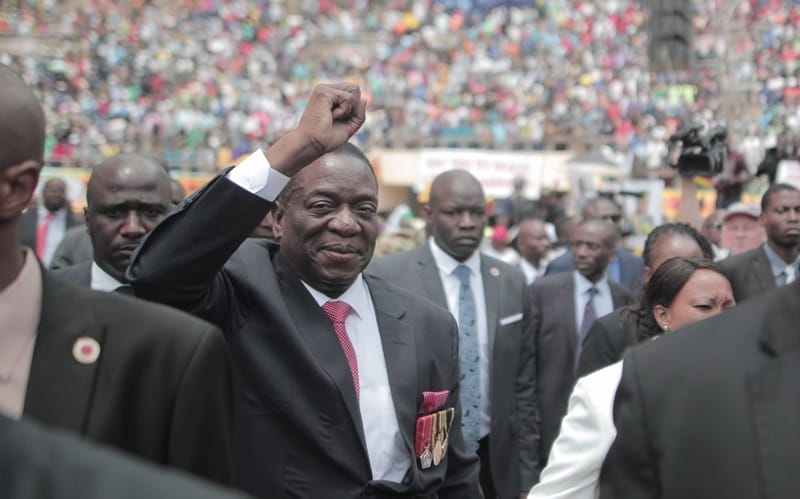
New Zimbabwean president Emmerson Mnangagwa, aka ‘the Crocodile’, after his swearing-in ceremony in Harare, 24th November 2017. Photo: SIPA USA / PA IMAGES
Less than 24 hours later, Mugabe finally capitulated. Lawmakers who gathered to hear an impeachment motion against the president on 21st November never got to vote. Instead, a note, passed to the speaker of parliament to read aloud, marked the end: “I, Robert Gabriel Mugabe… hereby formally tender my resignation as the president of the Republic of Zimbabwe with immediate effect…” In a rare moment of harmony, politicians across the spectrum, from the opposition to ZANU-PF members, cheered and embraced one another. Three days later, Emmerson Mnangagwa was sworn in as the new president.
That Mugabe’s resignation was more bureaucratic than dramatic mattered little to ordinary Zimbabweans. It was enough that he had gone. For many the economic woes, international isolation and crushing repression over which he presided had become intolerable.
To understand Robert Mugabe, you have to understand how he was raised”
As word spread in Harare of the resignation, the crowd at the main intersection grew from a couple of dozen passers-by to thousands. Boom boxes were set up. Trucks were transformed into ad hoc open-air party buses, drivers slowed to pick up revellers and loop round and round the block. Parents hoisted their children up on armoured personnel carriers to pose for photos with soldiers.
The celebratory antics took many different forms. I saw a man happily dancing alone in nothing but a clown wig and boxer shorts as well as angry groups stamping on portraits of Mugabe. Another reveller drew a small and delighted crowd by doing an impersonation of the former president. He adjusted his glasses fussily, stuttered and squinted as he made to sign an imaginary resignation agreement, briefly pretending to fall asleep part way through. The carnival went on long into the night.
“A quiet boy”
The start of Mugabe’s reign had also been met with celebrations. In January 1980 tens of thousands of people lined the streets of Harare, then still called by its colonial-era name of Salisbury. After nearly four decades of conflict, Rhodesia – as Zimbabwe, Britain’s last outpost in Africa, was then known – was on the cusp of independence. Mugabe, a veteran of the guerrilla war against Rhodesian white-minority rule, and leader of the Zimbabwean African National Union (ZANU), was the hero of the hour. The crowds had gathered to welcome him home from exile in Mozambique. Three months later he would be the country’s prime minister.
“Robert is an interesting figure,” says Father Fidelis Mukonori, leaning his stocky frame back in his faux-leather chair and gesturing expansively. Above him hangs a large, brightly coloured tapestry of the Last Supper, a gift from the children at the Chishawasha Catholic boarding school where we meet. “I think to understand him, you have to understand… how he was raised,” he continues.

Father Fidelis Mukonori at Chishawasha Catholic school. Photo: Harriet Salem
Robert Gabriel Mugabe was born at the Kutama mission just outside Harare, in what was then Southern Rhodesia on 21st February 1924. He was one of six children in a poor and religious family. His mother taught prayers to the local kids in exchange for a small stipend from the church. His father, a carpenter, was a difficult figure – he quarrelled with the local priest, forcing his family to move before later abandoning them in search of work and taking a second wife, with whom he had three more children.
All of these factors, says Mukonori, a lifelong confidant of Mugabe, were instrumental in shaping the man that he became – particularly his father’s desertion: “He felt strongly, even as a young boy, that he would never ask for anything. He had to assume leadership in his family very early because of his father’s absence.”
A Jesuit priest, Mukonori is more than 20 years Mugabe’s junior. But as a close family friend of Mugabe’s mother and sisters he can recount a stream of stories from the former president’s childhood. “He was a quiet boy, a reserved boy,” says Mukonori. “Sure, he would play-fight with the other children, but he learned to love books at a young age, and at some point he would take his book from his pocket and just disappear to read on his own.”
Mugabe’s childhood love of books eventually became his vocation. With backing from the church, he trained as a teacher – no small achievement in Rhodesia, where less than four percent of black citizens gained a secondary education. His small salary was devoted to supporting his mother and siblings.
He was serious… he spoke like a teacher addressing his students”
It was not until he studied at university in South Africa that he was introduced to the African nationalism, and later Marxism, which led him to believe that violent political struggle was the only way to win independence from oppressive white- minority rule in his home country. It was this time, studying at the University of Fort Hare, that Mugabe would later describe as the “turning point” in his life, which set him on the path from teacher to leader of a revolutionary guerrilla movement.
“Revolution was everywhere”
Like Mugabe, Fay Chung was a teacher turned revolutionary. “Everyone in academia was a Marxist, students and lecturers alike,” she says, remembering her time at Zambia’s Lusaka University as an English and drama-studies lecturer. “Marxism was sweeping across southern Africa, revolution was everywhere.”
In Rhodesia, the communist-backed black nationalists set their sights on the government of Ian Smith, which had entrenched policies widely perceived as nakedly racist. Blacks were effectively disenfranchised in Rhodesia due to income, education and property-ownership requirements for voter registration. Smith had unilaterally declared Rhodesia’s independence from the UK in 1965 – a move which the UK refused to acknowledge – and embarked on a major counter- insurgency campaign.
I meet Chung, who served as a minister under Mugabe from 1980 until 1993, at a café in one of Harare’s many dilapidated strip malls. A petite Chinese woman in her late seventies with an infectious giggle, she says she was initially turned down when she tried to join ZANU, until they decided her Chinese heritage meant she “wasn’t white” and was therefore eligible. Initially Chung is modest about her role in the struggle for Zimbabwe’s independence, dismissing it as “not particularly exciting”. Later, however, she recounts a series of escapades including her time spent smuggling guerrilla fighters across the Zambian border, before eventually fleeing to Tanzania in fear of her life.
“He was serious… he spoke like a teacher addressing his students,” Chung says approvingly of the first time she saw Mugabe, in late 1974. Along with a couple of hundred other ZANU supporters, she had crammed into a small garage in downtown Lusaka to hear speeches by the party’s leaders. “You could barely move, people were crushing each other to get closer to the front,” she says. “We all wanted to be there, to hear what they would say.”
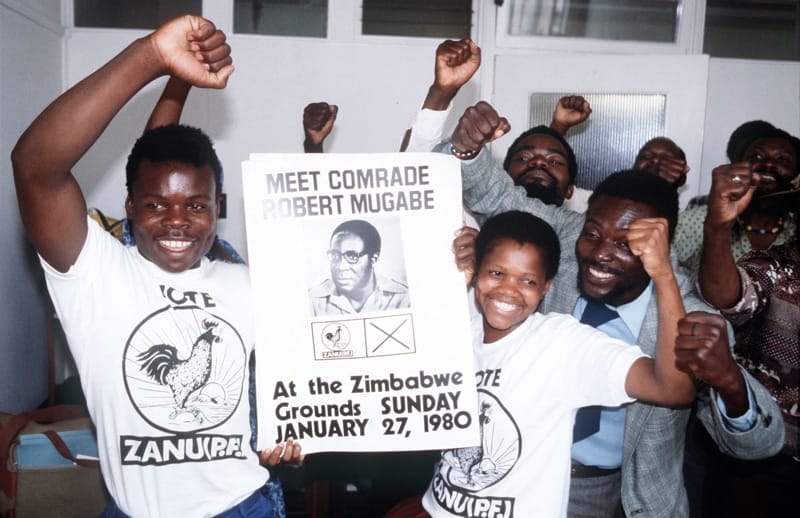
Supporters of Robert Mugabe hold a campaign poster in the run-up to the 1980 Southern Rhodesian general election. Photo: PA Archive/ PA Images
Mugabe, branded a “Marxist terrorist” by Smith, had just been released from more than a decade of captivity in Rhodesian jails where he had served a sentence for his active role in ZANU, a banned organisation in Rhodesia. While in prison he had become ZANU’s de facto leader after his predecessor was ousted in an internal coup. Meanwhile, on the outside, the movement for independence in Zimbabwe had escalated from the civil disobedience of the 1960s into a full-blown and bloody war. Violence frequently spilled across into neighbouring Mozambique and Zambia, where the guerrillas had set up base camps, and thousands had been displaced across the borders.
As the conflict deepened, the number of guerrillas fighting increased dramatically. Chung remembers attending the 1976 Geneva Conference, an attempt at negotiating peace between all the warring parties, initiated by then-US secretary of state Henry Kissinger. It was one of Mugabe’s first public appearances as the leader of ZANU and, amid the chaos of war and after ten years in jail, he didn’t recognise some of his own commanders. “He didn’t know what was what and who was who,” says Chung with a laugh.
Neither side was willing to compromise and the talks were eventually suspended, never to be resumed, following a slanging match between the Rhodesian government and Mugabe, as well as squabbling between guerrilla factions. The fighting between the government and the guerrillas would continue for three more years.
“The real revolutionaries”
“We did not achieve a military victory, we achieved a compromise,” Mugabe said of the historic Lancaster House agreement, reached on 21st December 1979 under pressure from Britain’s Conservative government led by Margaret Thatcher. In exchange for a halt in the fighting, Mugabe and his fellow revolutionary Joshua Nkomo, head of rival guerrilla group the Zimbabwe African People’s Union (ZAPU), were allowed to run in elections to be held early the following year in which white politicians would be guaranteed 20 percent of seats in the country’s parliament. In the intervening period Britain would assume temporary rule over the territory.
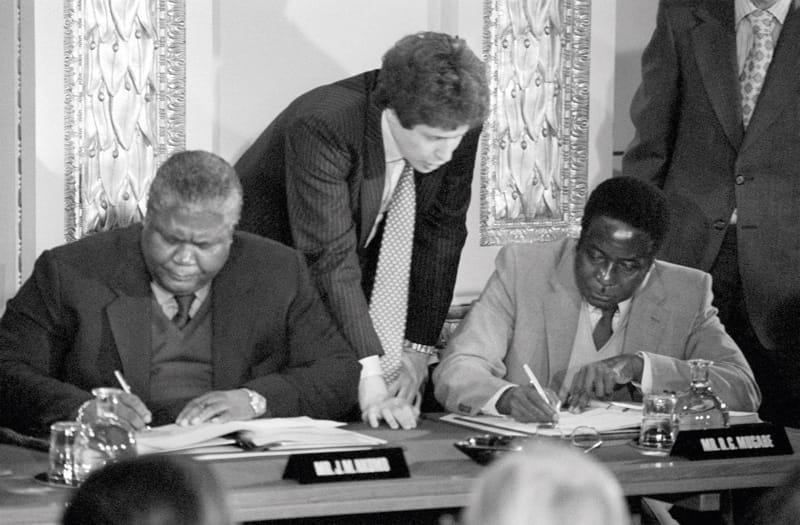
Guerrilla leaders Joshua Nkomo and Robert Mugabe signing the Rhodesia ceasefire agreement at Lancaster House in London, 1979. Photo: PA Archive / PA Images
Mugabe led ZANU to victory in the election, winning 57 of 100 seats, and became the first prime minister of Zimbabwe when the country officially received its independence from the UK in April 1980.
Three days before the official handover, Bob Marley and his entourage arrived in Harare for a concert to mark the occasion, only to find the hotels fully booked by dignitaries and officials. They ended up sharing rooms in a rundown joint some 20 miles outside the city.
Marley was an active supporter of the liberation struggle and penned a 1979 song, ‘Zimbabwe’, in support of the revolutionary fighters. The reggae superstar’s songs were a favourite of ZANU guerrillas, who played his tracks on worn tape decks to boost morale in their remote mountain hideouts. When Zimbabwe’s independence celebrations were announced, Marley decided that he had to perform, financing the gig out of his own pocket and flying in on a commercial flight via Nairobi. Prince Charles is said to have offered to let him join the royal entourage in business class; Marley declined.
The two did, however, eventually meet in passing on the stage. Grainy video footage shows the Union flag being lowered and furled as the British national anthem played. Prince Charles stood to attention, looking solemn. Moments later, in the first words to be officially uttered in the newly independent country, Bob Marley and the Wailers were welcomed to the stage. Marley stood in front of a sea of ecstatic faces and Zimbabwean flags and lost himself in an almost trancelike state. “Zimba-b-we…” he sang. “To divide and rule could only tear us apart, in every man’s chest there beats a heart. So, soon we’ll find out who are the real revolutionaries…”
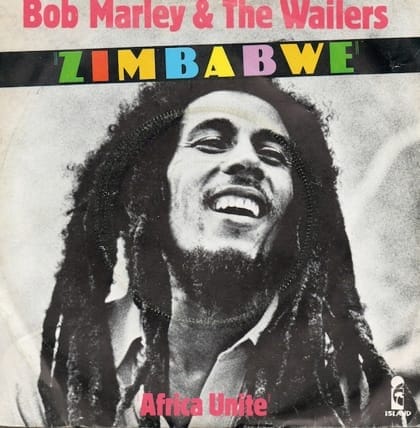
“It was really a magical moment,” says Mukonori, who had spent years documenting atrocities for the Catholic Commission for Peace and Justice during the long-running civil war. “Finally after all this suffering we were free.”
The initial euphoria didn’t last long, however. While Zimbabwe was finally free from white- minority rule, she was by no means freed from her past. Nearly 100 years of colonial rule and four decades of war had left an indelible mark on the country. Thousands had been killed and thousands more wounded or forced into exile.
Within two weeks of his return to Zimbabwe, Mugabe – who had spent years in exile hopping between Tanzania, Mozambique and Zambia – had survived two assassination attempts. In one incident, a grenade was thrown through the window of his house; in the other he narrowly avoided death when a remote-controlled device detonated 80 pounds of explosives stuffed in a drainage pipe just moments after his convoy had passed over it. The blast left a 10-foot-deep, 30-foot-wide hole in the ground. Both incidents were blamed on renegade Rhodesian forces who had refused to accept the outcome of the Lancaster House agreement.
I used to pooh-pooh this tribal thing… I don’t pooh-pooh it any more”
But it wasn’t just tensions between blacks and whites that continued to fester. Independent Zimbabwe’s first government was an uneasy alliance of the veterans from its two liberation movements, ZANU and ZAPU. Throughout the war the two groups had increasingly become divided along tribal lines, with Mugabe heading the Shona-dominated ZANU and Nkomo leading the Ndebele-dominated ZAPU. The rival factions had not only fought against the white Rhodesian regime, but at various points during the four-decade struggle for independence had also attacked each other.
“I used to pooh-pooh this tribal thing,” says Chung. “I think that’s what most of the intelligentsia said, like me, that it’s nonsense, that it’s an invention of colonialists. But now I look back I see things differently, with what went on to happen, I think we were idealistic. I don’t pooh-pooh it any more.”
In 1981 when Mugabe demoted Nkomo from his position as home affairs minister, accusing him of being a “cobra in the house” and plotting a coup, the fragile national unity government all but disintegrated. One war had only just ended, but already another even more bloody and brutal one was about to start.
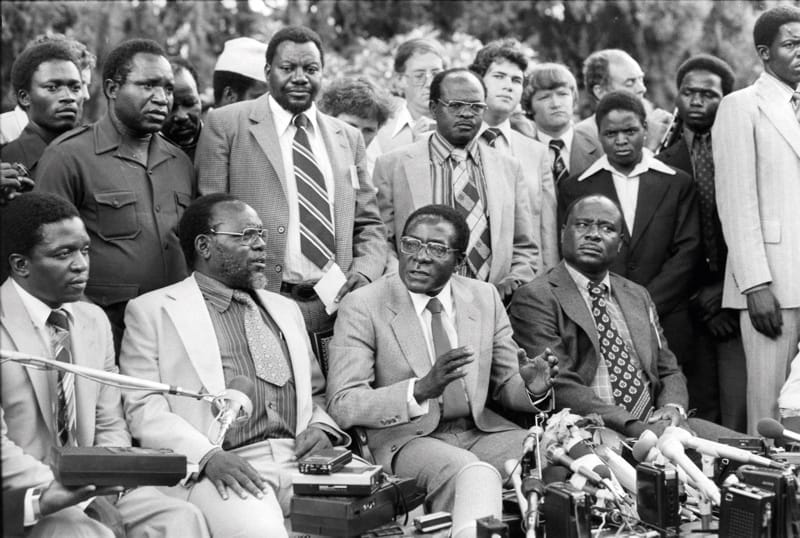
Robert Mugabe with a team of colleagues on 18th April 1980, shortly after taking office as prime minster of Zimbabwe. Photo: Buthaud Gerald / ANDBZ / ABACA / PA Images
“Bang, bang, bang”
“The menace has reached such epic proportions that the government has to bring DDT to get rid of the bandits,” Mnangagwa, then security minister, told supporters in Victoria Falls on 5th March 1983.
The “bandits” Mnangagwa referred to were the Ndebele people of Matabeleland in southwestern Zimbabwe, seen as supporters of ZAPU. The “DDT”, or pesticide, was a euphemism for the brutal North Korean-trained Fifth Brigade: after liberation Mugabe had visited North Korea, expressed admiration for the country and organised for it to send a military deputation over on a teaching mission. Elite North Korean troops trained Zimbabwean soldiers in counter-insurgency between 1981 and 1982 at the mountain base of Inyanga near the border with Mozambique.
I could see by the look in their eyes they were ready to kill”
Mlindazwe Ndlovu (not his real name) was just 11 when Fifth Brigade soldiers came to his door. It was 1983 and after Zimbabwe’s liberation his brother Themba, a former ZAPU guerrilla, had swapped his gun for a pen and retrained as a teacher, the mirror opposite of Mugabe’s own journey. The brothers lived together in humble accommodation at a school in Tsholotsho, a Ndebele-dominated district in the west of the country.
“I could see by the look in their eyes they were ready to kill,” Ndlovu, now 46, recalls. “They shouted: ‘Where is he? Where is he?’” When his brother emerged from the bedroom, still half-asleep, the soldiers “didn’t ask any questions,” Ndlovu says quietly. They fired five shots into his stomach and left him to die. Themba’s body, wrapped in rugs and bundled on to the roof of a bus to Bulawayo, the nearest city, was given a “pauper’s funeral”.
Over the next five years, any pretence that the government was just mounting a targeted operation against rogue ZAPU guerrilla elements was quickly abandoned. Soldiers set about terrorising the mainly rural Ndebele population, civilians and former guerrillas alike.
It was not the sound of fighting, it was the sound of men being executed”
After the death of his brother, Ndlovu went to stay with his aunt in a rural homestead some 150 kilometres away. The situation there in the remote countryside was even worse. Soldiers had established basecamps across the region. At night locals were marched to schools and forced to sing and dance as suspected ‘dissidents’ were subjected to horrific torture, including being burned alive. “You could hear gunshots out in the bush,” Ndlovu says, grimacing. “But it was not the sound of fighting, it was the sound of men being executed. Bang, bang, bang. Just like that, one after the other.”
A 2005 report by the International Association of Genocide Scholars put the death toll from the five-year campaign against the Ndebele at around 20,000, around the same number of people killed in the nearly four-decade-long fight for Zimbabwe’s independence. But while those killed in the liberation struggle were lauded and celebrated as heroes, the victims of what became known as Gukurahundi – a Shona phrase roughly translating as ‘the early rain which washes away the chaff before spring’ – were buried in a deep and terrifying silence.
Mugabe had us killed because we were Ndebele. There’s no question about it”
Public acknowledgement of the killings in Zimbabwe has been nearly non-existent. Mass graves of victims are still being excavated, and many families have never recovered the remains of loved ones who disappeared during the operation. Mugabe has never directly admitted responsibility for the killings, calling the massacres a “moment of madness” orchestrated by rogue elements in the army. Ndlovu is clear, however, in ascribing blame. “Mugabe had us killed because we were Ndebele,” he says. “There’s no question about it, there’s no other reason, my brother was killed because he was ZAPU and Mugabe did not want any opposition. He made that clear in 1983.”
The end of the conflict in 1987 was eventually brought about by a merger between ZANU and ZAPU, into a party thereafter known as ZANU-PF. Just seven years after independence, Zimbabwe had effectively become a one-party state.
“The basket case of Africa”
As the police broke through their front door with sledgehammers and bolt cutters in May 2017, the Smart family fled out of the back of their farm in Makoni in the eastern province of Manicaland and made for the hills. From their hiding place they could see men throwing their belongings out of the house. The looters set their tractors on fire. Antique furniture, plates and toys littered the yard. As they watched the chaos below, the children cried. “We could hear gun shots below, they burnt down the workers’ houses, it was pandemonium,” said 71-year-old Rob Smart when I first met him in November 2017.
The Smarts had been among the few hundred white farmers left in Zimbabwe. The trouble started in early 2017 with a knock at the door. The man standing outside claimed he had paperwork entitling him to part of the farm. Over the next 12 weeks a campaign of aggressive intimidation – led by a local bishop and backed by corrupt law-enforcement officials armed with tear gas and AK-47s – aimed to push the Smart family out their home, where they had been living for three generations.
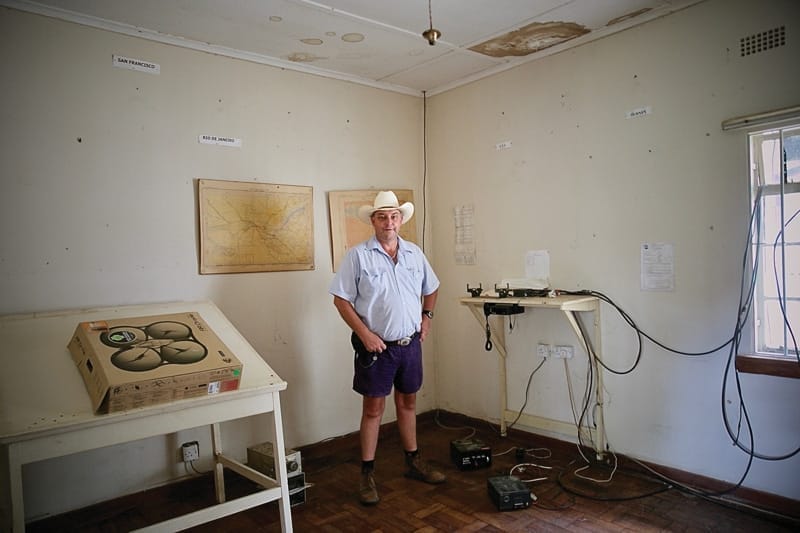
Darryn Smart in his ransacked study at Lesbury Farm in Tandi, one of the last to be seized under Mugabe’s ‘fast track’ land reforms. Photo: Harriet Salem
In the months following their eviction the family became dependent on the charity of friends, wearing borrowed clothes and staying in the sparsely furnished bungalow where I met them.
The violent land grab, known as jambanja in Shona, was a signature policy of the Mugabe era. Over the last 17 years more than 3,000 farms have been seized from whites, most violently, under Mugabe’s so-called “fast-track” land reforms. “If white settlers just took the land from us without paying for it, we can, in a similar way, just take it from them without paying for it,” the president declared of the policy.
But while the land reforms were accompanied by the rhetoric of righting historical wrongs, in practice they were little more than a crackdown on opposition. Mugabe blamed the white farmers, who made up a small but influential percentage of the population, for supporting the fledgling opposition movement, the Movement for Democratic Change, and causing his defeat in a constitutional referendum in 2000.
The policy of jambanja effectively destroyed Zimbabwe’s agriculture sector, the backbone of the country’s economy. Although it was ostensibly aimed at redistributing land to poor black Zimbabweans, many of the best plots of land were given to Mugabe’s cronies, who saw ownership as a status symbol but were not interested in the upkeep of the farms, leaving land to lie fallow and valuable equipment to rust. Other farms were divided up into smaller plots and given to black farmers, many of whom lacked both the equipment and agricultural training to farm efficiently. Economies of scale were lost and resources intended to support the new farmers were frequently pilfered by corrupt officials.
Food production plummeted. Between 2000 and 2003, maize farming yields dropped from 1.5 million tonnes to less than 500,000. Zimbabwe went from being a supplier of food to southern Africa to a net importer, with some 25 percent of the population on food aid. “That man (Mugabe) destroyed the country for all Zimbabweans,” said Rob Smart’s son Darryn ruefully. “Zimbabwe went from being the breadbasket of Africa to the basket case of Africa because of him.”
“Playing nice”
By the late 2000s the banking sector had all but collapsed and unemployment had rocketed to 90 percent. Foreign investors, wary of a climate in which state-sponsored seizure of assets had become the norm, withdrew from the country. In response to the land seizures the European Union, International Monetary Fund and US government all imposed sanctions on Mugabe and his inner circle. Zimbabwe’s costly involvement in the war in the Democratic Republic of Congo (DRC) further drained the state’s coffers. By mid-November 2008 hyperinflation had reached a staggering 79.6 billion percent and Zimbabweans needed a backpack to carry enough money to buy a single loaf of bread.
At the end of 2008 Zimbabwe abandoned its currency and adopted the US dollar. While this stabilised the rampant inflation of the early 2000s, economic uncertainty has led to persistent and chronic cash shortages. Zimbabweans continue to queue overnight at ATMs for morning cash deliveries and withdrawals are capped at $30 per day.
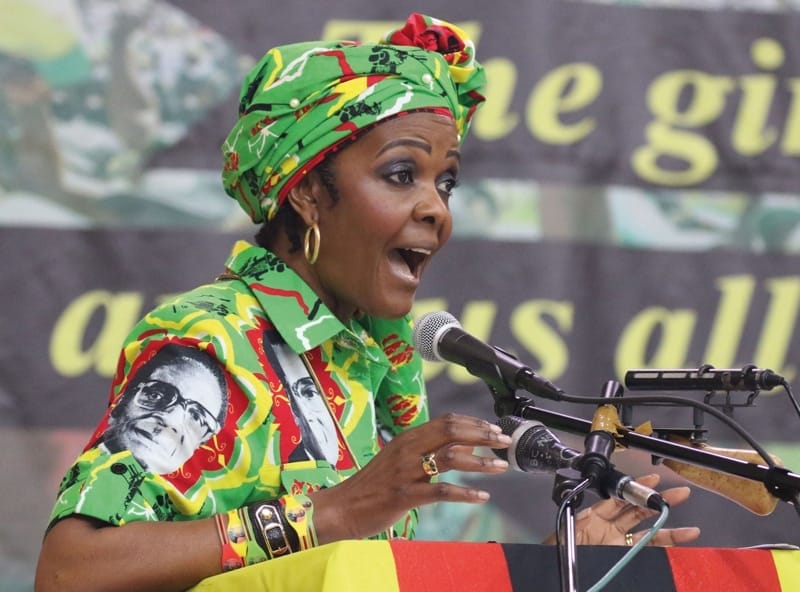
Zimbabwe’s former first lady Grace Mugabe, speaking in Harare, July 2017. Photo: Stringer / Xinhua News Agency / PA Images
Such conditions have been all the harder to bear when contrasted with the luxurious lifestyle of Mugabe’s second wife, Grace, 52, nicknamed ‘Gucci Grace’ or the ‘First Shopper’, who is said to have once spent £75,000 on a single shoe-buying spree in Paris. For many, her bid to set herself up as Mugabe’s successor was typical of ZANU-PF’s corruption and nepotism. “When you see how Grace has been living – with her sports cars and designer clothes – while you can’t afford to send your children to school, that makes you angry,” says Linda Masarira, who will stand as an opposition candidate for Harare Central in elections later this year.
Masarira, a vocal critic of Mugabe for more than a decade, first became an activist when she founded a trade union for railway workers. After organising demonstrations in protest over months of unpaid wages she was abducted, tortured, accused of trying to overthrow the government and sacked from her IT job with the National Railways of Zimbabwe. “When I started it was about the wages,” she says with a sigh. “But you quickly learn it’s also about everything else too. None of this would be happening – the kidnappings, the killings, the theft of people’s rights – if it weren’t for the system. The politicians, their corruption, their greed, that’s the real problem.”
I meet Masarira in Harare’s African Unity Square. It is 30th January 2018 and a dozen activists are holding up placards saying “Bring back Itai Dzamara”. Dzamara was a journalist and political activist who was abducted on 9th March 2015 after mounting lone protests calling for Mugabe to step down. Patson Dzamara, his brother, says that Mnangagwa, the man who ousted Mugabe, must answer the question of what happened to Itai and dozens of other missing activists, if he is to prove that he is truly committed to a new era in Zimbabwe. “It’s a simple question with a simple answer and those in power have it,” says Patson. “They need to return Itai to us, dead or alive.”
Harare’s community of activists is small and tight-knit. Most gathered here, like Masarira, have been detained and beaten by the country’s security forces. Some have faced trumped-up charges and court cases for offences ranging from theft to treason. This demonstration is the first since Emmerson Mnangagwa was sworn in as president on 24th November and they don’t yet know what the response will be. “I guess we have to hope he’s playing nice for now while everyone is watching Zimbabwe,” says Masarira with a nervous laugh.
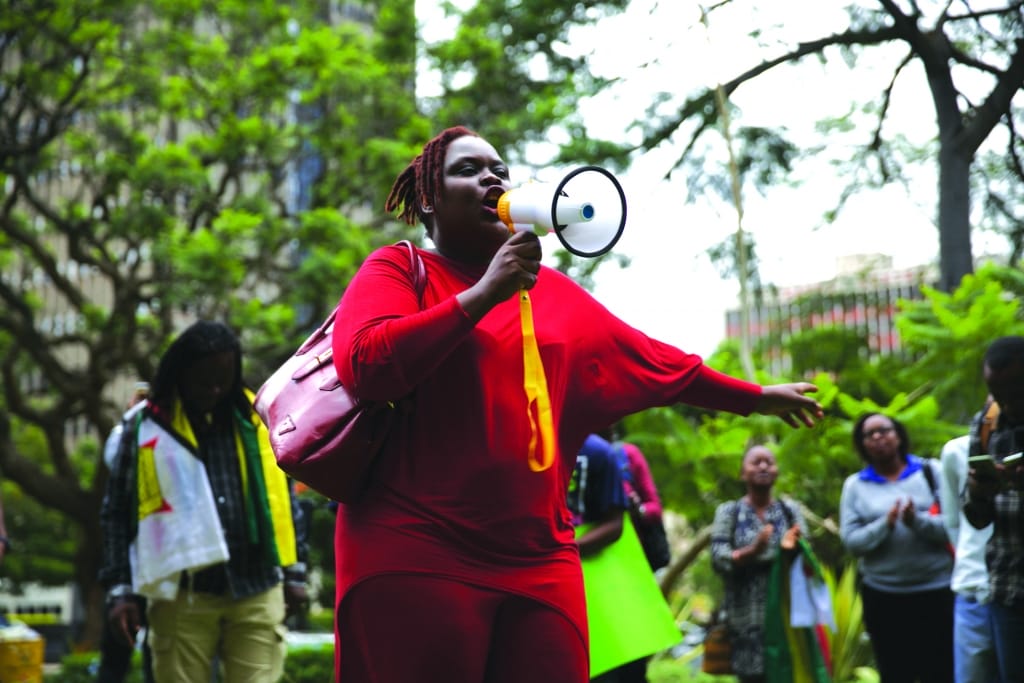
Human rights activist Linda Masarira speaks at a protest at African Unity Square in Harare to demand information about the disappearance of Itai Dzamara. Photo: Harriet Salem
“No place like home”
There’s plenty to be nervous about. As well as his role in Gukurahundi, Mnangagwa, nicknamed ‘the Crocodile’, is accused of having orchestrated a bloody campaign of killing, disappearances and intimidation of opposition activists during the 2008 election and of organising vote rigging in the 2013 election – both of which were eventually won by Mugabe. He was also a vocal supporter of the violent evictions of white farmers and stands accused by the United Nations of war-profiteering from diamonds during Zimbabwe’s intervention in the DRC.
Some, however, are willing to give Mnangagwa the chance to start anew. When I arrive at the Smart family farm in late January 2018, Darryn Smart greets me with a broad grin and a firm handshake. He’s wearing his signature cowboy hat. The farm is a hive of activity. The tobacco season has already been missed, and the workers must hurry if they are to get a potato crop planted on time. The farmhouses are also in a state of disrepair. Most of the furniture light enough to carry away is gone. Smart’s office is almost bare – the looters even took the clocks showing the times from across the world, leaving just city names hanging on the wall.
Not only were we able to protest freely, we were able to march to State House”
But none of this seems to bother Smart. He’s in his element. “We’re over the moon to be back,” he says. “There’s really no place like home.” Shortly after Mnangagwa’s inauguration it was announced that the family’s farm would be returned to them – and they’ve just received even more good news. In Zimbabwe the state owns all farming land, and under Mugabe whites only received five year leases, while blacks were given 99 years. Now interim president Emmerson Mnangagwa’s government has pledged that everyone will receive the full 99 years. Smart has already applied for his. It is, he hopes, the beginning of a “new era in Zimbabwe”.
Not everyone is so optimistic about the future, however. Pastor Evan Mawarire, a cult figure in Zimbabwe’s activist scene thanks to his viral #thisflag video in which he lamented the state of the country, was among those who called for people to take to the streets to demand Mugabe’s resignation on 18th November. “Not only were we able to protest freely, we were able to march to State House,” he tells me, describing the “cherry on top” as being able to carry a placard saying ‘Mugabe must go’ – something that was “unimaginable” for most Zimbabweans just days before. Now, however, he says there are already the signs of a return to the “same old, same old”.
Mnangagwa and the army removed Robert Mugabe for their own selfish interests and personal gain, not because they wanted to change Zimbabwe”
Mnangagwa’s choice of cabinet members, “a mix of ZANU-PF old timers and military guys” is troubling, says Mawarire. Another “bad indication”, he says, is the “propensity of the new government to use soldiers for civic matters”. Just days before we speak in January, a group of young protesters was arrested and beaten by the army after holding a protest about the Gukurahundi massacres during a visit by Mnangagwa to the city of Bulawayo in the heart of Matabeleland.
A few weeks later, in mid-February, Mnangagwa announced that exiled white farmers would not be given their land back. “It will never happen,” he told ZANU-PF supporters in a televised speech.
Linda Masarira says that she is unsurprised by the developments. “It’s the same faces, so why would you expect something different?” she asks. “They, Mnangagwa and the army, removed Robert Mugabe for their own selfish interests and personal gain, not because they wanted to change Zimbabwe. It has never been about us, Zimbabweans, it has always been about them, since independence in 1980.”
Slow Journalism in your inbox, plus infographics, offers and more: sign up for the free DG newsletter. Sign me up
Thanks for signing up.
